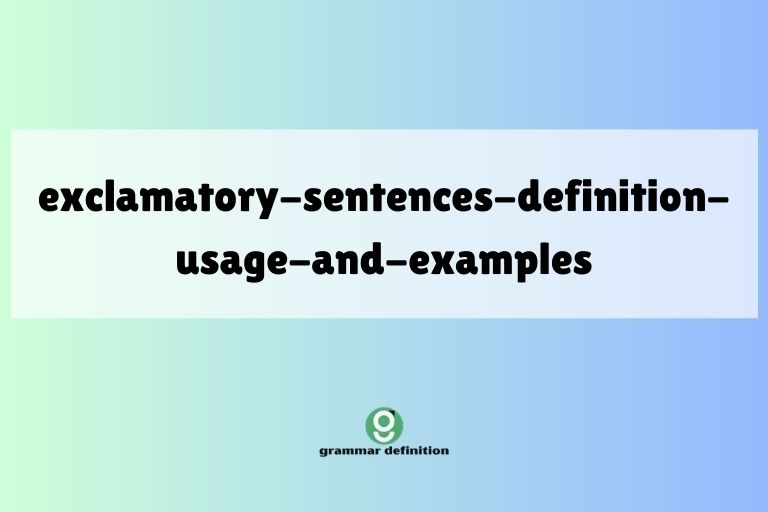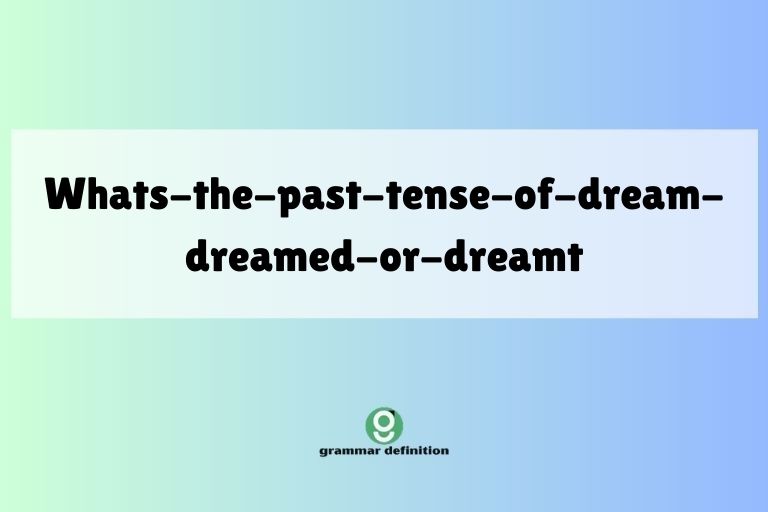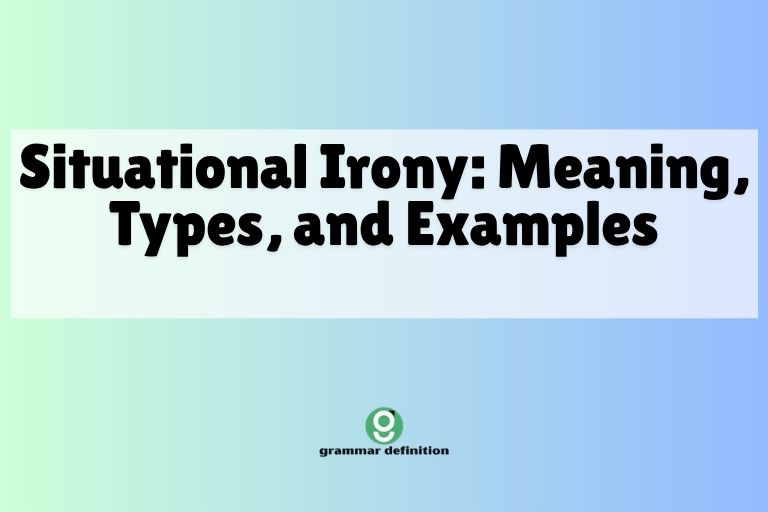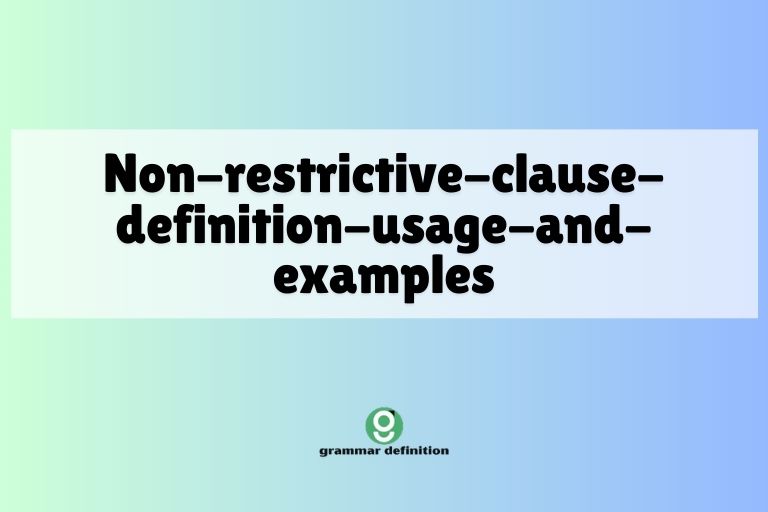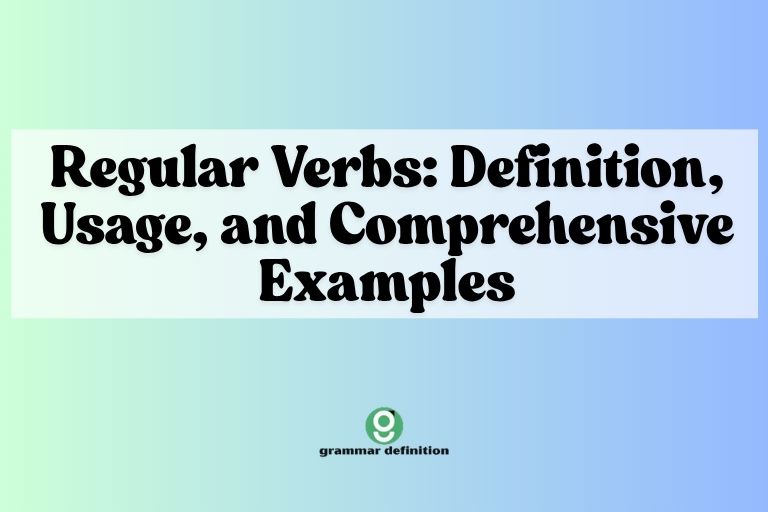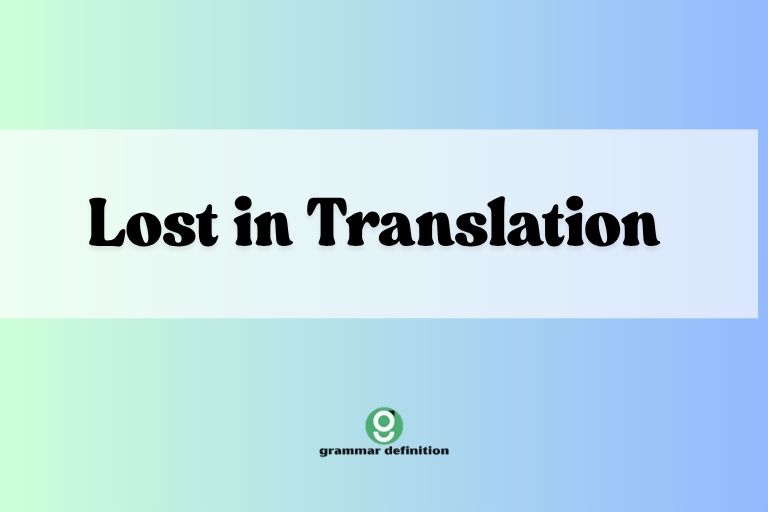Mastering Complex Sentences: Definition, Usage, and Examples
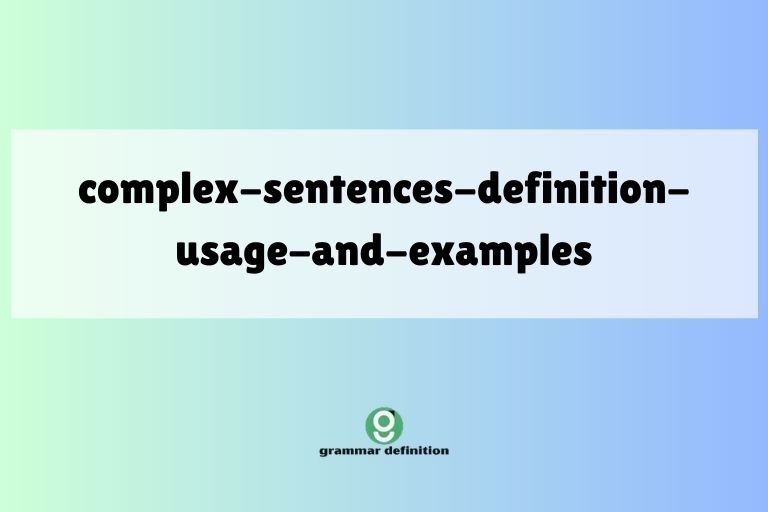
Complex sentences are a cornerstone of sophisticated English writing and speaking. They allow us to express intricate relationships between ideas, adding depth and nuance to our communication.
Understanding how to construct and use complex sentences effectively is crucial for anyone aiming to achieve a higher level of English proficiency. This article provides a comprehensive guide to complex sentences, covering their definition, structure, types, usage rules, common mistakes, and providing ample examples and practice exercises.
Whether you’re an ESL learner, a student preparing for an exam, or simply someone looking to refine your writing skills, this guide will equip you with the knowledge and tools you need to master complex sentences.
This guide will benefit students, teachers, and writers who want to improve their understanding of grammar and sentence construction. By mastering complex sentences, they can enhance the clarity, sophistication, and overall impact of their writing and communication.
Table of Contents
- Definition of a Complex Sentence
- Structural Breakdown of Complex Sentences
- Types of Dependent Clauses
- Examples of Complex Sentences
- Usage Rules for Complex Sentences
- Common Mistakes with Complex Sentences
- Practice Exercises
- Advanced Topics in Complex Sentences
- Frequently Asked Questions (FAQ)
- Conclusion
Definition of a Complex Sentence
A complex sentence is a sentence that contains one independent clause and at least one dependent clause. An independent clause is a clause that can stand alone as a sentence because it expresses a complete thought. A dependent clause, also known as a subordinate clause, cannot stand alone as a sentence because it does not express a complete thought. It relies on the independent clause to give it meaning.
Dependent clauses are typically introduced by subordinating conjunctions (such as because, although, if, when, while, since, that, who, which, and whom) or relative pronouns (such as who, whom, which, that, and whose). These words connect the dependent clause to the independent clause and indicate the relationship between the two clauses.
The key characteristic of a complex sentence is the hierarchical relationship between its clauses. The dependent clause provides additional information about, or modifies, the independent clause.
This modification can take various forms, such as specifying a cause, condition, time, place, or reason.
Structural Breakdown of Complex Sentences
The basic structure of a complex sentence can be represented as follows:
- Dependent Clause + Independent Clause (e.g., Because it was raining, we stayed inside.)
- Independent Clause + Dependent Clause (e.g., We stayed inside because it was raining.)
The order of the clauses can vary. When the dependent clause comes before the independent clause, a comma is usually used to separate the two clauses.
When the independent clause comes before the dependent clause, a comma is generally not needed, unless the dependent clause is nonrestrictive (i.e., provides extra, non-essential information).
The subordinating conjunction or relative pronoun introduces the dependent clause and establishes the relationship between the dependent and independent clauses. It’s crucial to choose the correct conjunction or pronoun to accurately convey the intended meaning.
Let’s break down the structure of a complex sentence with an example:
“Although the sun was shining, the air was cold.”
- Dependent Clause: Although the sun was shining
- Subordinating Conjunction: Although
- Subject: the sun
- Verb: was shining
- Independent Clause: the air was cold.
- Subject: the air
- Verb: was
- Complement: cold
Types of Dependent Clauses
Dependent clauses can be classified into three main types based on their function within the sentence: adjective clauses, adverb clauses, and noun clauses.
Adjective Clauses
An adjective clause modifies a noun or pronoun in the independent clause. It provides additional information about the noun or pronoun, answering questions like “which one?” or “what kind?” Adjective clauses are usually introduced by relative pronouns (who, whom, which, that, whose) or relative adverbs (where, when, why).
For example: “The book that I borrowed from the library is very interesting.” In this sentence, the adjective clause “that I borrowed from the library” modifies the noun “book.”
Adverb Clauses
An adverb clause modifies a verb, adjective, or another adverb in the independent clause. It provides information about time, place, manner, cause, purpose, condition, or degree. Adverb clauses are introduced by subordinating conjunctions such as because, although, if, when, while, since, where, as, and so that.
For example: “Because it was raining, we decided to stay home.” In this sentence, the adverb clause “Because it was raining” modifies the verb “decided,” indicating the reason for the decision.
Noun Clauses
A noun clause functions as a noun in the independent clause. It can act as a subject, object, complement, or appositive. Noun clauses are often introduced by words like that, what, who, whom, which, whoever, whomever, whichever, whether, if, and how.
For example: “What he said surprised everyone.” In this sentence, the noun clause “What he said” acts as the subject of the verb “surprised.”
Examples of Complex Sentences
The following sections provide examples of complex sentences, categorized by the type of dependent clause they contain. Each table presents a range of examples to illustrate the variety of ways in which complex sentences can be constructed and used.
Adjective Clause Examples
This table provides examples of complex sentences using adjective clauses. The adjective clause modifies a noun or pronoun in the main clause, adding descriptive detail.
| Sentence | Adjective Clause | Modified Noun/Pronoun |
|---|---|---|
| The car that he bought is very expensive. | that he bought | car |
| The woman who lives next door is a doctor. | who lives next door | woman |
| The book which I recommended is now a bestseller. | which I recommended | book |
| The house where I grew up is still standing. | where I grew up | house |
| The student whose essay won the competition is very talented. | whose essay won the competition | student |
| He is the man whom I met at the conference. | whom I met at the conference | man |
| The movie that we watched last night was amazing. | that we watched last night | movie |
| The teacher who inspired me the most is retiring this year. | who inspired me the most | teacher |
| The city where I want to live is known for its culture. | where I want to live | city |
| The song that she sang became a hit. | that she sang | song |
| The painting that was displayed at the museum was stolen. | that was displayed at the museum | painting |
| The dog that barked all night belongs to my neighbor. | that barked all night | dog |
| The cake which she baked was delicious. | which she baked | cake |
| The reason why I’m late is because of the traffic. | why I’m late | reason |
| The actor who played the main role won an award. | who played the main role | actor |
| The dress that she wore to the party was stunning. | that she wore to the party | dress |
| The university where he studied is very prestigious. | where he studied | university |
| The person who helped me was very kind. | who helped me | person |
| The flowers that she planted are blooming beautifully. | that she planted | flowers |
| The idea that he proposed was innovative. | that he proposed | idea |
| The problem which we need to solve is complex. | which we need to solve | problem |
| The solution that they found was effective. | that they found | solution |
| The animal that I saw at the zoo was a giraffe. | that I saw at the zoo | animal |
| The country that I want to visit is Japan. | that I want to visit | country |
| The project that we are working on is due next week. | that we are working on | project |
| The game that they played was very exciting. | that they played | game |
| The song that I listened to made me happy. | that I listened to | song |
| The movie that I watched was directed by Steven Spielberg. | that I watched | movie |
Adverb Clause Examples
This table provides examples of complex sentences using adverb clauses. The adverb clause modifies a verb, adjective, or another adverb in the main clause, indicating time, place, manner, cause, purpose, condition, or degree.
| Sentence | Adverb Clause | Type of Modification |
|---|---|---|
| Because it was raining, we stayed inside. | Because it was raining | Cause |
| We will go to the park if the weather is nice. | if the weather is nice | Condition |
| When I finish my work, I will go home. | When I finish my work | Time |
| They went where they could find shade. | where they could find shade | Place |
| Although he was tired, he kept working. | Although he was tired | Concession |
| She sings as if she were an angel. | as if she were an angel | Manner |
| I study hard so that I can get good grades. | so that I can get good grades | Purpose |
| Since you are here, we can start the meeting. | Since you are here | Reason |
| He ran faster than he had ever run before. | faster than he had ever run before | Comparison |
| While I was walking to school, I saw a deer. | While I was walking to school | Time |
| As soon as the bell rings, the students will leave. | As soon as the bell rings | Time |
| He will succeed provided that he works hard. | provided that he works hard | Condition |
| Wherever you go, I will follow you. | Wherever you go | Place |
| Even though it was expensive, I bought the car. | Even though it was expensive | Concession |
| She spoke so quietly that no one could hear her. | so quietly that no one could hear her | Result |
| Before you leave, make sure to lock the door. | Before you leave | Time |
| Unless it rains, we will have a picnic. | Unless it rains | Condition |
| They arrived after the movie had started. | after the movie had started | Time |
| Whenever I see him, he’s always smiling. | Whenever I see him | Time |
| He acted as though nothing had happened. | as though nothing had happened | Manner |
| If I were you, I would apologize. | If I were you | Condition |
| I will visit you when I have time. | when I have time | Time |
| Since it is getting late, we should go home. | Since it is getting late | Reason |
| You can sit wherever you like. | wherever you like | Place |
| Although she was nervous, she gave a great speech. | Although she was nervous | Concession |
| He did it as he was told. | as he was told | Manner |
| I exercise regularly so that I can stay healthy. | so that I can stay healthy | Purpose |
Noun Clause Examples
This table provides examples of complex sentences using noun clauses. The noun clause functions as a noun in the main clause, acting as a subject, object, complement, or appositive.
| Sentence | Noun Clause | Function |
|---|---|---|
| What he said surprised everyone. | What he said | Subject |
| I don’t know what I should do. | what I should do | Object |
| The question is whether we can afford it. | whether we can afford it | Complement |
| His belief, that he is always right, is annoying. | that he is always right | Appositive |
| Whoever wins will receive a prize. | Whoever wins | Subject |
| She told me that she was going to quit. | that she was going to quit | Object |
| How he did it remains a mystery. | How he did it | Subject |
| I am not sure if I can come. | if I can come | Object |
| The problem is that we don’t have enough time. | that we don’t have enough time | Complement |
| What you need is a good rest. | What you need | Subject |
| He explained why he was late. | why he was late | Object |
| That he is innocent is clear. | That he is innocent | Subject |
| I wonder whether she will accept the offer. | whether she will accept the offer | Object |
| The truth is that I lied. | that I lied | Complement |
| What I want is a cup of coffee. | What I want | Subject |
| They discussed how they would solve the problem. | how they would solve the problem | Object |
| It is obvious that he is lying. | that he is lying | Subject |
| I don’t understand why she left. | why she left | Object |
| Her excuse was that she missed the bus. | that she missed the bus | Complement |
| Whatever you decide is fine with me. | Whatever you decide | Subject |
| She didn’t mention where she was going. | where she was going | Object |
| The fact is that we are running out of time. | that we are running out of time | Complement |
| How they managed to escape is still a mystery. | How they managed to escape | Subject |
| I’m curious about what he will say. | what he will say | Object |
| The challenge is how we can improve our sales. | how we can improve our sales | Complement |
Usage Rules for Complex Sentences
Using complex sentences correctly involves understanding several key rules:
- Subordinating Conjunctions and Relative Pronouns: Choose the correct conjunction or pronoun to accurately express the relationship between the clauses. Using the wrong word can change the meaning of the sentence.
- Comma Usage: When the dependent clause comes before the independent clause, use a comma to separate them. When the independent clause comes first, a comma is usually not needed, unless the dependent clause is nonrestrictive.
- Subject-Verb Agreement: Ensure that the verb in each clause agrees with its subject. This is especially important in noun clauses that act as the subject of the sentence.
- Tense Consistency: Maintain consistent verb tenses within the sentence, especially when describing events that occur at different times.
- Clarity and Conciseness: While complex sentences can add depth to your writing, avoid making them overly complicated. Ensure that the meaning is clear and easy to understand.
Specifically, consider the following points:
- Restrictive vs. Nonrestrictive Clauses: A restrictive clause is essential to the meaning of the sentence and is not set off by commas. A nonrestrictive clause provides additional, non-essential information and is set off by commas. For example: “The book that I borrowed from the library is interesting” (restrictive). “My car, which is a Toyota, is very reliable” (nonrestrictive).
- “That” vs. “Which”: “That” is used for restrictive clauses, while “which” is used for nonrestrictive clauses. “Which” is always preceded by a comma when used in a nonrestrictive clause.
- Avoiding Sentence Fragments: Ensure that each clause has a subject and a verb. A dependent clause standing alone is a sentence fragment and should be avoided.
Common Mistakes with Complex Sentences
Several common errors can occur when using complex sentences. Understanding these mistakes can help you avoid them in your own writing.
| Incorrect | Correct | Explanation |
|---|---|---|
| Because I was tired, I went to bed. And I fell asleep immediately. | Because I was tired, I went to bed and fell asleep immediately. | Avoid using a separate sentence when the ideas can be combined into a single complex sentence. |
| The book which I like is on the table. | The book that I like is on the table. | Use “that” for restrictive clauses. |
| Although, he was late, he apologized. | Although he was late, he apologized. | Do not put a comma after “although” at the beginning of a sentence. |
| I don’t know that he is doing. | I don’t know what he is doing. | Use “what” to introduce a noun clause referring to an action. |
| Because of the rain, I I stayed home. | Because of the rain, I stayed home. | Avoid unnecessary repetition. |
| He is the person who I think is the best. | He is the person whom I think is the best. | Use “whom” when it is the object of the verb in the relative clause. |
| If I would have known, I would have helped. | If I had known, I would have helped. | Use the correct conditional tense. |
| The reason why I am late, is because the traffic. | The reason I am late is because of the traffic. OR The reason why I am late is that there was traffic. | Avoid redundant use of “why” and “because.” |
| She asked me that if I was coming. | She asked me if I was coming. | Omit “that” when “if” or “whether” introduces an indirect question. |
| He said that he will arrive tomorrow. | He said that he would arrive tomorrow. | Maintain tense consistency in reported speech. |
Practice Exercises
These exercises will help you practice constructing and identifying complex sentences. Each exercise focuses on a different aspect of complex sentence usage.
Exercise 1: Identifying Complex Sentences
Identify whether each of the following sentences is simple, compound, or complex.
| Sentence | Type | Answer |
|---|---|---|
| Because it was cold, I wore a coat. | Complex/Compound/Simple | Complex |
| I went to the store, and I bought milk. | Complex/Compound/Simple | Compound |
| The dog barked loudly. | Complex/Compound/Simple | Simple |
| Although he was tired, he finished the race. | Complex/Compound/Simple | Complex |
| She likes to read books and watch movies. | Complex/Compound/Simple | Simple |
| When the rain stops, we will go outside. | Complex/Compound/Simple | Complex |
| He studied hard, so he passed the exam. | Complex/Compound/Simple | Compound |
| The cat slept on the couch. | Complex/Compound/Simple | Simple |
| If you need help, ask me. | Complex/Compound/Simple | Complex |
| She is intelligent, but she is also lazy. | Complex/Compound/Simple | Compound |
Exercise 2: Combining Sentences into Complex Sentences
Combine the following pairs of sentences into complex sentences using the subordinating conjunctions provided.
| Sentences | Subordinating Conjunction | Combined Sentence |
|---|---|---|
| He was late. He missed the bus. | Because | Because he missed the bus, he was late. |
| It rains. We will stay inside. | If | If it rains, we will stay inside. |
| I finish my work. I will go home. | When | When I finish my work, I will go home. |
| He was tired. He kept working. | Although | Although he was tired, he kept working. |
| You are here. We can start the meeting. | Since | Since you are here, we can start the meeting. |
| I study hard. I can get good grades. | So that | I study hard so that I can get good grades. |
| I was walking to school. I saw a deer. | While | While I was walking to school, I saw a deer. |
| The bell rings. The students will leave. | As soon as | As soon as the bell rings, the students will leave. |
| He works hard. He will succeed. | Provided that | He will succeed provided that he works hard. |
| You go. I will follow you. | Wherever | Wherever you go, I will follow you. |
Exercise 3: Filling in the Blanks
Complete the following sentences with an appropriate dependent clause.
| Sentence | Possible Answer |
|---|---|
| ________, I decided to take a nap. | Because I was feeling tired |
| She will be happy ________. | if she gets the job |
| We went to the beach ________. | where the waves were high |
| ________, he managed to win the game. | Even though he was injured |
| I will call you ________. | when I arrive |
| ________, she started to cry. | When she heard the news |
| He left the party ________. | before it got too late |
| ________, I always feel happy. | Whenever I see the sun |
| She is studying hard ________. | so that she can pass the exam |
| ________, he went for a walk. | After he had finished his work |
Advanced Topics in Complex Sentences
For advanced learners, several more complex aspects of complex sentences can be explored:
- Elliptical Clauses: Elliptical clauses are dependent clauses in which some words are omitted because they are understood from the context. For example, “While (I was) walking, I saw a friend.”
- Embedded Clauses: Complex sentences can contain multiple levels of embedding, with dependent clauses nested within other dependent clauses. This can create very intricate and nuanced sentences.
- Variations in Word Order: While the standard word order in English is subject-verb-object, this can be varied in complex sentences for stylistic effect. For example, “Seldom have I seen such beauty.”
- The Subjunctive Mood: The subjunctive mood is used in certain types of dependent clauses to express wishes, suggestions, or hypothetical situations. For example, “I suggest that he be present at the meeting.”
Understanding these advanced topics can further enhance your ability to use complex sentences effectively and creatively.
Frequently Asked Questions (FAQ)
Here are some frequently asked questions about complex sentences:
- What is the difference between a complex sentence and a compound sentence?
A complex sentence contains one independent clause and at least one dependent clause. A compound sentence contains two or more independent clauses joined by a coordinating conjunction (e.g., and, but, or) or a semicolon.
- Do I always need a comma when the dependent clause comes first?
Yes, you generally need a comma when the dependent clause precedes the independent clause. The comma indicates a pause and separates the two clauses clearly. For example: “Because it was raining, we stayed inside.”
- Can a complex sentence have more than one dependent clause?
Yes, a complex sentence can have multiple dependent clauses. These clauses can be of different types (adjective, adverb, or noun) and can modify different parts of the independent clause. For example: “Because he studied hard, he got a good grade, which made his parents proud.”
- What is a nonrestrictive clause, and how does it affect comma usage?
A nonrestrictive clause provides additional, non-essential information about a noun or pronoun. It is set off by commas. For example: “My car, which is a Toyota, is very reliable.” If the information is essential (restrictive), no commas are used: “The car that I bought yesterday is red.”
- How can I improve my ability to write complex sentences?
Practice is key. Start by identifying complex sentences in your reading material. Then, try combining simple sentences into complex sentences using different subordinating conjunctions and relative pronouns. Pay attention to comma usage and verb tense consistency.
- When should I use complex sentences in my writing?
Use complex sentences when you want to express complex relationships between ideas, add detail and nuance to your writing, or vary your sentence structure. Avoid overusing them, as too many complex sentences can make your writing difficult to understand.
- What are some common subordinating conjunctions?
Some common subordinating conjunctions include because, although, if, when, while, since, that, who, which, whom, where, as, so that, before, after, until, unless, even though, and whenever.
- What are some common relative pronouns?
Some common relative pronouns include who, whom, which, that, and whose.
Conclusion
Mastering complex sentences is essential for effective and sophisticated communication in English. By understanding their structure, types, and usage rules, you can enhance the clarity,
sophistication, and overall impact of your writing and speaking.
This guide has provided a comprehensive overview of complex sentences, equipping you with the knowledge and tools to use them confidently and accurately. Remember to practice regularly and pay attention to the nuances of language, and you will soon find yourself communicating with greater precision and eloquence.

